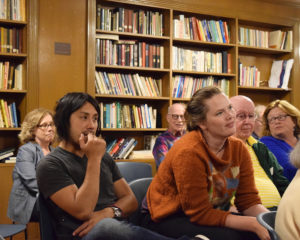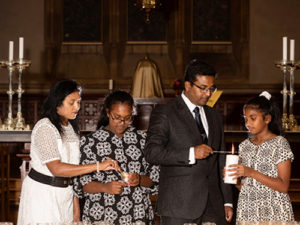
January
The ICMC President marked the New Year with an appeal to continue working together in the vital mission of welcoming, protecting, promoting and integrating uprooted people worldwide.

March
ICMC extended sympathies to the families of the four Catholic Relief Services staff, fellow humanitarians and all others killed in the Ethiopian Airlines plane crash on 10 March.

March
ICMC expressed sorrow over the 15 March terror attacks against Muslim worshipers in Christchurch, New Zealand, and gratitude for the work of its national member, Caritas New Zealand.

April
The ICMC Secretary General was asked to assist the Sovereign Order of Malta as it prepared a document on humanitarian principles in the context of faith-based organizations and religious leaders.

July
The ICMC Secretary General participated in planning with the Vatican’s Refugees and Migrants Section for a resource document with pastoral guidelines on Church responses to internally displaced persons.

June
At a high-level Catholic migration event in Germany, the ICMC Secretary General advocated for strategies to make implementation of the Global Compact for Refugees more equitable and bring about a new international refugee regime.

November
The ICMC Secretary General participated in a meeting organized by the Symposium of Episcopal Conferences of Africa and Madagascar (SECAM) to strengthen solidarity in the Church’s response to irregular migration in North Africa.

December
Seventy representatives of Episcopal Conferences and local and international organizations from 25 countries gathered in Bangkok, Thailand, for a meeting of the ICMC Asia-Oceania Working Group.

December
The meeting of the ICMC Asia-Oceania Working Group was followed by a High-Level Inter-Religious Dialogue on the Future of Work: Labour after Laudato Sì.
A Path out of Bondage
It is a familiar story for Sr. Kochurani Joseph, Secretary to the Commission of Migrants of the Catholic Bishops’ Conference of India (CBCI) North Region.
A self-styled recruiting agent entices youth in a remote Indian village to a big city with the promise of a good job or better education. But what lies behind the luring words is, more often than not, the harsh reality of prostitution or bonded labor, a modern form of slavery.
Though outlawed, bonded labor has some 40 million Indian men, women and children in its grip and this increasingly includes internal migrants. People move in search of a job from an impoverished to a wealthier – and unfamiliar – part of the country, where they don’t speak the language. They are highly vulnerable to being trafficked.
Sr. Joseph alerts potential migrants to the risks of trafficking and rescues those trapped in forced labor. She also defends their rights before the respective court systems in India.
“People are not aware of the laws,” she says. She and her colleagues train local parishes and communities across India about bonded labor and how to rescue survivors. And work to raise awareness of safe migration practices.
Protecting Children, Ending Trafficking in Asia and the Pacific
The ICMC Asia-Oceania Working Group has provided a space since 2008 for members in the region to share experiences and work together to protect and serve uprooted people. In December the Working Group gathered over 70 representatives of Episcopal Conferences and local and international organizations from 25 countries in Bangkok, Thailand.
A roundtable at the meeting explored one of ICMC’s thematic priorities for 2019 – the needs of migrant children. Panel members lifted up the vulnerability of children on the move, particularly young migrants on their own without family or caregivers. They noted the need to use mechanisms, such as the Global Compact for Migration and the UN Convention of the Rights of the Child, to protect migrant children and guarantee their rights. Participants emphasized that responses should put children at the center, be tailored to their specific situation, and equip them to make decisions about their own future.
The Working Group heard from ICMC Governing Committee member and Treasurer, Sr. Maryanne Loughry, Ph.D., RSM, about the Church’s action in Australia to offer alternatives to incarcerating children on the move alone, followed by a report about work in Bangladesh to open the door to a better life for children forcibly displaced within the country.
Human trafficking, a further ICMC priority in 2019, was the focus of another Working Group panel in Bangkok. Members looked at best practices and ways to address the phenomenon, which is of particular concern in the region, with strong links to migration and bonded labor. Examples of engagement in Thailand and across the region showed how the Church is active to prevent trafficking and support survivors in building a new life.
An International, Catholic-Inspired Voice on Migration
In 2019 ICMC engaged in the Church’s fight against human trafficking at the international level, in close collaboration with the Migrants and Refugees Section of the Vatican’s Dicastery for Promoting Integral Human Development.
Drawing from its field work supporting survivors of trafficking and of sexual and gender-based violence, ICMC contributed in-depth insights to the development of a new Vatican resource published in January. Titled Pastoral Orientations on Human Trafficking, the booklet responds to the increasing risk of trafficking faced by migrants. It explores what trafficking is, why it exists, how it is often hidden from view – and how the Catholic Church can take action, from the local to the international level, based on its centuries-long Teaching and Tradition, to eradicate it.

On Building Community
Most people outside a refugee camp have no idea what life actually is like on the inside. To mark the World Day of Migrants and Refugees on 29 September, ICMC’s Boston-based office partnered with the immigration advocacy group of The Paulist Center to reflect on challenges and opportunities among uprooted people thousands of miles away. They screened the film Soufra, which tells the story of Mariam, a refugee and culinary entrepreneur in Lebanon who builds community by putting food on the table of her customers and employees alike. The audience experienced hope and shock at the realities of life in the refugee camp. The event strengthened their determination to learn more and engage in creating welcoming communities at home.
ICMC assisted in the planning of a Vatican-convened international conference in April that looked at how the Church can put the Pastoral Orientations into action in the fight against human trafficking. Some 200 participants, including an ICMC delegation of Governing Committee members and staff, shared information and best practices of Catholic-inspired work in this area. The conference outlined 42 action proposals as priority tasks for the Church to prevent trafficking, protect survivors and respond to specific realities such as sexual exploitation, forced labor and human smuggling.
In his closing remarks to the conference, ICMC Secretary General Msgr. Robert J. Vitillo urged participants not to lose sight of the resilience of those affected by human trafficking. He pointed to the real-life experience that survivors can contribute and called for Catholic-inspired action to involve migrants and refugees who have been trafficked.
ICMC underlined the need for labor migration that respects human dignity at an international conference on the contribution of religions to the Sustainable Development Goals held in Vatican City in March. Speaking from a Catholic Church-inspired perspective on work and growth, the ICMC Secretary General lifted up the positive impact of voluntary, regular labor migration with safe, dignified working conditions. Such mobility of labor furthers both economic and – importantly from a Catholic standpoint – integral human development.
ICMC recognized how Church teachings urge us to call into question migration regimes that disrespect human dignity and rights. Speaking at the 2019 St Thomas More Forum in Canberra, Australia, ICMC President Dr. Anne T. Gallagher pointed to the centrality of the family, compassion and care for the most vulnerable in Catholic teachings. These function as guiding values for the Church to respond to human suffering in an increasingly indifferent world where migration has become a flashpoint.
At a high-level event of the Commission for Migration of the German Bishops’ Conference in June, ICMC proposed that the Global Compact on Refugees could assist governments to usher in a new regime to welcome, protect and integrate forcibly uprooted refugees in their respective countries. Highlighting the need for increased refugee resettlement and complementary admission pathways, the ICMC Secretary General appealed to governments to make strong, multi-year pledges at the first-ever Global Refugee Forum in December.
In February ICMC co-organized a workshop aiming to improve cooperation between faith-based organizations, other NGOs, the UN and governments in response to HIV/AIDS among uprooted populations. The ICMC Secretary General reminded participants of the heightened vulnerability to HIV of migrants and refugees and the particular challenges they face in accessing health care. The participants in this inter-faith and inter-agency gathering prepared a roadmap to increase cooperation in the areas of prevention; testing, care and support; addressing sexual and gender-based violence; and eliminating stigma and discrimination.
“How can we embrace the Holy Father’s message to confront and reject the globalization of indifference? The Church’s teachings around family, around compassion and support for the most vulnerable should guide us in challenging policies and actions that undermine these values.” — ICMC President Dr. Anne T. Gallagher
Member's story
Invitation to a Journey of Transformation
If, as Pope Francis has said, “it is not just about migrants”, what is it about then?
The Catholic Church in Australia invited parishes across the country to engage at a personal level with the Holy Father’s message for the 2019 World Day of Migrants and Refugees: Who are we and who do we want to become, what kind of society and Church do we want to create? Can the Church offer an alternative to fear, selfishness and closed borders?

A kit produced by the Office for the Migrant and Refugee Week in August offered resources for reflection, spiritual pilgrimage and prayer, lifting up the commonality of the human experience of migrating and seeking refuge. Bishop Max L. Davis, Delegate of the Australian Bishops for Migrants and Refugees, highlighted the call to examine attitudes and actions towards uprooted people, to recognize the dignity and value in each person as God does.
The Catholic Alliance for People Seeking Asylum (CAPSA) spoke about the transformative impact of journeying with uprooted people in Victoria and other parts of Australia. “Compassion is at play,” in all corners of the Catholic community, they reflected – “in spite of fear, or perhaps while overcoming it.” In walking with people seeking asylum, Catholics are living an “ongoing encounter,” which is transforming their own lives as well as those of the people they are assisting.
Stories of welcome from communities in different parts of Australia showed in concrete terms how the Church opens itself to migrants and refugees. English classes and outreach to refugees in Perth. The Welcoming Parish Initiative of the West Australian Catholic Migrant & Refugee Office. Multicultural “Neighbors for Newcomers” teams in Tamworth. A prayer service co-organized by the Adelaide Archdiocese and the Sri Lankan Catholic Association of South Australia for those affected by the Easter Sunday bombings in Colombo.
In preparation for the Migrant and Refugee Week, missionary clergy and religious in Australia serving migrant and uprooted people explored the effect of walls on those that build them, with a focus on constructing a culture of encounter and welcome. ICMC Secretary General Msgr. Robert J. Vitillo was invited to participate in this event and to share the experience of ICMC as it networks among Catholic-inspired migrant and refugee service organizations in all parts of the world.
“Over the years as I have met and worked with people seeking asylum, I have been welcomed by them just as often as I have been the one attempting to extend welcome to them. It is in these encounters that I have been changed and challenged.” – CAPSA worker

